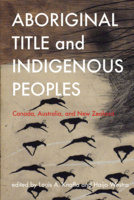Law and Society

Founding editor: W. Wesley Pue
The Law and Society Series explores law as a socially embedded phenomenon. It is premised on the understanding that the conventional division of law from society creates false dichotomies in thinking, scholarship, educational practice, and social life. Books in the series treat law and society as mutually constitutive and seek to bridge scholarship emerging from interdisciplinary engagement of law with disciplines such as politics, social theory, history, political economy, and gender studies.
The Freedom of Security
Governing Canada in the Age of Counter-Terrorism
A trenchant exploration of how security and counter-terrorism practices are not only eroding civil liberties, but reshaping the very nature of our political freedom.
Transforming Law's Family
The Legal Recognition of Planned Lesbian Motherhood
Drawing on the rarely heard voices of Canada’s lesbian mothers, Transforming Law’s Family explores the legal dimensions of planned lesbian parenthood and proposes avenues for legal change.
Critical Criminology in Canada
New Voices, New Directions
A new generation of critical criminologists examines the future of criminology and criminal justice in Canada.
In Defence of Principles
NGOs and Human Rights in Canada
This exploration of the activities of four Canadian NGOs in advancing and defending human rights principles sheds new light on the fragility and resilience of human rights norms in liberal democracies.
The Politics of Acknowledgement
Truth Commissions in Uganda and Haiti
This book examines the failure of truth commissions in Uganda and Haiti and develops a rigorous framework to evaluate truth commissions around the world.
Constructing Crime
Contemporary Processes of Criminalization
Five unique case studies reveal how crime is being constructed and enforced in contemporary Canada.
Aboriginal Title and Indigenous Peoples
Canada, Australia, and New Zealand
Offers a perspective on Aboriginal title and land rights that extends beyond national borders and the contemporary context to consider historical developments in common law countries.
Constitutional Politics in Canada after the Charter
Liberalism, Communitarianism, and Systemism
The first systematic analysis of general theories about Canada’s post-Charter constitutional evolution.
Contested Constitutionalism
Reflections on the Canadian Charter of Rights and Freedoms
Contested Constitutionalism is a critique of Canadian democracy, judicial power, and the place of Quebec and Aboriginal peoples within the federation, all of which have been altered by the Charter’s introduction in 1982.
A Perilous Imbalance
The Globalization of Canadian Law and Governance
Tackles the pressing question of how Canadian engagement with globalization can be marshaled to advance rather than impair human security, ecological integrity, and social emancipation.










